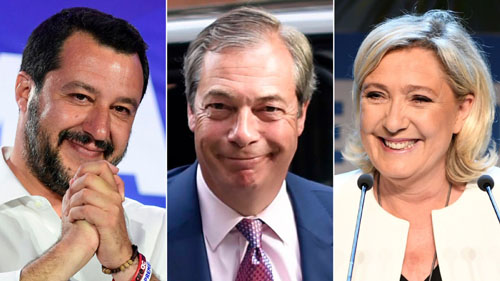by WorldTribune Staff, May 27, 2019
“A new Europe is born,” Italian Interior Minister Matteo Salvini declared after his Lega Nord (League) Party surged to victory in Italy’s European Union vote.
“I am proud that the League is participating in this new European renaissance,” Salvini said.
The League’s triumph was one of many for nationalists and populists in the EU voting.

In Great Britain, Nigel Farage’s Brexit Party, which was formed less than two months ago, soared to an historic victory which some analysts said could lead to Farage becoming prime minister.
In France, Marine Le Pen’s National Rally secured victory against President Emmanuel Macron’s En Marche.
In Germany, Chancellor Angela Merkel’s coalition was routed at the polls.
Farage has warned the Brexit Party is now set up to “stun everybody” in a general election if Britain fails to leave the European Union on Oct. 31.
The Brexit Party secured a majority with 31.7 percent of the votes in the UK, winning 28 seats in the EU Parliament in Brussels.
“When people woke up on March 30 this year, and realized we hadn’t left the European Union, that’s when in large numbers they became ready to vote for a different party,” Farage said. “The Brexit Party is only six weeks old, think about that context, this is one hell of an achievement.”
Farage added that if Great Britain does not leave the EU by Oct. 31, “then the Brexit Party will go on to a general election and stun everybody there too.”
Metro UK noted that “if the European elections results are anything to go by, Farage could win a majority if a general election is called later this year and land in the leading seat.”
Farage said his “primary goal” is for the UK to leave the EU, and has warned the government to deliver Brexit or face humiliation by his party.
Asked if he would work with Boris Johnson if he was elected as Britain’s next prime minister, Farage said: “If it’s to achieve Brexit, I’ll work with anybody,” adding “we are happy to help any leader who is genuine about us leaving the EU. We would like to be a part of the negotiation team, use us and give us some responsibility, but they need to prepared to leave with a clean break Brexit. This is just the beginning of a new political movement.”
In Italy, Salvini’s party won 34.3 percent of the vote in the May 26 election.
“The time has come to totally re-discuss old and outdated rules that have hurt Europe. Otherwise a vote like this cannot be explained,” Salvini said at a news conference in Milan.
Salvini, who spent much of the election campaign promising deep tax cuts in possible defiance of EU fiscal rules, showed no sign of backing down. Lower taxes were “the key issue” for Italians and would be the foundation of next year’s budget to be presented in the autumn, Salvini said.
In France, Le Pen and her lead candidate, Jordan Bardella, turned the election into a referendum on Macron’s first two years in power and his pro-EU policies.
“The French people have sent a very clear message and a lesson in humility” to Macron, Bardella told supporters. “It’s him and his politics that have been rejected.”
Le Pen, analysts say, hopes to build an alliance in Europe alongside Salvini and others who say EU nations have surrendered too much “sovereignty” to Brussels.
In Germany, Merkel’s embattled coalition said it would hold crisis talks on May 27.
Voters handed her CDU party and its center-left coalition partner SPD their worst score in European election history, while doubling support for the Greens, who made rising fears over global warming their top issue.
Der Spiegel said the Merkel coalition is “in danger” after the EU vote.
“This instability can lead to a breakup at any time. The CDU and SPD are deeply insecure parties. If, for example, SPD leader (Andrea) Nahles were to fall, the question of the continued existence of the coalition would immediately arise.”
Intelligence Brief __________ Replace The Media
